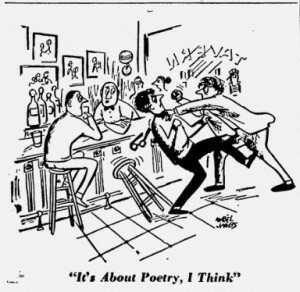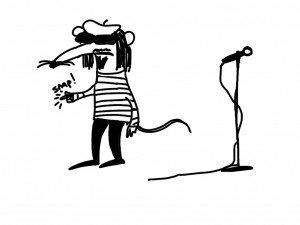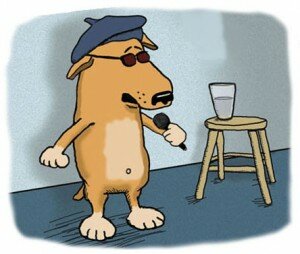No More Excuses: Kayla Cagan on Poetry for Poetry Haters
Hello Haters. (And of course, Hello Lovers.)
Grab a cup of coffee. Sit for a minute and try not to jump out of your skin.
Here comes your worst nightmare: a well meaning friend trying not-so-subtly to push poetry on you.
Over the years, I’ve heard your arguments and excuses and explanations and observations about why poetry just isn’t for you. I’ve taken these conversations seriously. I’ve rolled them around in my head, debating your pros and cons. I’ve tried to understand.
So, you should know that I’m not trying to convert you into becoming a poetry reader, writer, or advocate. I’ve simply taken on the task, during National Poetry Month, to show you the options of what you might be missing, to give you the gift of the poem or poet that might just be right for you, or the special poetry hater in your life. And I’ve sifted through what you’ve probably read in school or seen on motivational posters, hoping to find something new for your eyes and ears and heart and soul.
Okay, let’s get to it. Shall we?
Poems and Poets for The Top Ten Excuses that Poetry Haters give to Poetry Lovers
1. “Poetry is for sissies.”
Yes, sissies can enjoy poetry. So can non-sissies.
Bad ass American poet and outlaw Charles Bukowski wrote in Notes from a Dirty Old Man, ”If you want to know who your friends are, get yourself a jail sentence.”
If you want to read up on him, head to your nearest library to find one of Bukowski’s 60+ books, including 6 novels.
Other tough guys & fiesty broads who write/wrote the rough stuff: Ted Hughes, Sandra Cisneros, Tony Hoagland, Marge Piercy, Carrie Fountain, Henry Taylor, Stephen Dunn
2. “Poetry is too hard. I don’t understand poetry. I don’t get it.”
It was American poet Deborah Garrison in Fooling with Words: A Celebration of Writers and Their Craft who said, “I need to feel that the language in my poems is alive, in the sense of talking on the phone to a friend, sharing gossip.”
Not every poem you read has to be written in Middle English. Writers have producing poetry as long as they’ve been writing, and most of it doesn’t sound or look like Shakespeare or Chaucer. While poetry may not always be understood, what most poetry is trying to do is make sense of the world around it.
If you want to read more straightforward, thoughtful, engaging, and humorous poets, try Deborah Garrison, Robert Frost, Billy Collins, Mark Doty, and Rita Dove.
Still with me, Haters? Great!
3. I’m a jock. Poetry isn’t about sports.
Wrong! Quincy Troupe is a huge sports fan, just like many other poets. In “A Poem for Magic”, Troupe shows some love to the game of basketball and Magic Johnson. If you like the following excerpt, check out the entire poem, read by Mr. Troupe himself.
A Poem for Magic
“Take it to the hoop, “magic” johnson,
take the ball dazzling down the open lane
herk & jerk & raise your six-feet, nine-inch frame
into the air sweating screams of your neon name
“magic” johnson, nicknamed “windex” way back
in high school…”
And If basketball isn’t your jam, check out Robert Pinksy’s The Night Game and J Milton Haye’s My Old Football. You’re sure to score
4. Poetry is depressing.
You know what? I’m not going to argue with you here. A lot of poetry is very depressing, some is mildly depressing, and some is down-right not depressing at all. But sometimes we need these depressing poems to accompany us, to make us feel less alone, to be our quiet little partners in sad times. Misery loves company and it loves poetry and I prefer mine my depressing poems with a little snap. I’ve picked out one of my favorites by playwright, Tennessee Williams. His poetry is often overshadowed by his plays.
Life Story
After you’ve been to bed together for the first time,
without the advantage or disadvantage of any prior acquaintance,
the other party very often says to you,
Tell me about yourself, I want to know all about you,
what’s your story? And you think maybe they really and truly do
sincerely want to know your life story, and so you light up
a cigarette and begin to tell it to them, the two of you
lying together in completely relaxed positions
like a pair of rag dolls a bored child dropped on a bed.
You tell them your story, or as much of your story
as time or a fair degree of prudence allows, and they say,
Oh, oh, oh, oh, oh,
each time a little more faintly, until the oh
is just an audible breath, and then of course
there’s some interruption. Slow room service comes up
with a bowl of melting ice cubes, or one of you rises to pee
and gaze at himself with mild astonishment in the bathroom mirror.
And then, the first thing you know, before you’ve had time
to pick up where you left off with your enthralling life story,
they’re telling you their life story, exactly as they’d intended to all
along,
and you’re saying, Oh, oh, oh, oh, oh,
each time a little more faintly, the vowel at last becoming
no more than an audible sigh,
as the elevator, halfway down the corridor and a turn to the left,
draws one last, long, deep breath of exhaustion
and stops breathing forever. Then?
Well, one of you falls asleep
and the other one does likewise with a lighted cigarette in his mouth,
and that’s how people burn to death in hotel rooms.
Want a side of zip with your depressing poems? Check out Sylvia Plath, Louise Gluck, Mary Karr, Sharon Olds, and Dorothy Parker.
5. Poetry isn’t fun.
As in, you just gave me a list of depressing poems, thanks a lot. I know. But poems, and poetry, can be very fun and often joyous. Many poets find daily validations of the beauty and the humor in the world around them.
My favorite poet to write this way in the last 15 years is Billy Collins. His poems “I Chop Some Parsley While Listening to Art Blakey’s Version of “Three Blind Mice,” “Victoria’s Secret,” and “The Lanyard” are guaranteed to make you smile without feeling cheesy.
And if you like spending time with Mr. Collins, try out Hal Sirowitz, Dorothy Parker, James Tate, Allen Ginsburg, Deborah Garrison, Lucille Clifton, Dr. Seuss and Shel Silverstein for more laughs (some uplifting, some depressing) per lines.
6. Poetry is elitist.
Absolutely wrong. Poetry is free. Poetry is universal. Anybody who can write and/or read and/or listen is eligible to participate in poetry, formalist or free verse. Poetry is available to all.
Here’s a mini-list of the names of a few poets from every continent to peruse:
Africa — Keorapetse Kgositsile, Akinwande “Wole” Soyinka, Niyi Osundare
Antarctica– (New Zealand poet Bill Manhire went to Antarctica as an inaugural Antarctic Arts Fellow. There are no living poets, that are known, currently in Antarctica. If you know one, please comment below.)
Asia — Li Qingzhao, Li Shangyin, Matsuo Basho
Australia — Nick Cave, Gwen Harwood, Oodgeroo Noonuccal
Europe — Anthony Burgess, Carol Ann Duffy, Oscar Wilde
North America — Margaret Atwood, Carrie Fountain, Frank O’Hara
South America — Mário de Andrade, Vicente Huidobro, Pablo Neruda
So there.
7. Poetry is a luxury. I don’t have time for it.
Yes! You do! (See how short my answer is!) And here’s two speedy examples.
Fleas
Adam
Had ‘em
(Attributed to different poets, most notably Anon, Ogden Nash, Shel Silverstein)
Résumé
Dorothy Parker
Razors pain you;
Rivers are damp;
Acids stain you;
And drugs cause cramp.
Guns aren’t lawful;
Nooses give;
Gas smells awful;
You might as well live.
See how fast that was? Now get yourself a lollipop!
Other quickie poems can be found by e e cummings, Octavio Paz, William Carlos Williams, Mark Strand, James Tate, Maya Angelou, and Emily Dickinson.
8. When there’s so much wrong in the world, poetry doesn’t matter. It doesn’t change anything.
And I argue, that’s when poetry matters most: when the world seems rocky and at odds with our best intentions and goals, poetry can smooth our worries, or move us to courage and change. Here’s a poem, written in 1802 that holds up perfectly now. Observing life closely, we try to make our little chunk of the planet make sense.
The World Is Too Much with Us
by William Wordsworth
(written in 1802)
The world is too much with us; late and soon,
Getting and spending, we lay waste our powers;
Little we see in Nature that is ours;
We have given our hearts away, a sordid boon!
This Sea that bares her bosom to the moon,
The winds that will be howling at all hours,
And are up-gathered now like sleeping flowers,
For this, for everything, we are out of tune;
It moves us not. –Great God! I’d rather be
A Pagan suckled in a creed outworn;
So might I, standing on this pleasant lea,
Have glimpses that would make me less forlorn;
Have sight of Proteus rising from the sea;
Or hear old Triton blow his wreathèd horn.
Other poets to observe include Walt Whitman, Gary Snyder, Kay Ryan, Robert Lowell and Carl Sandburg.
9. I already have too much homework. I can’t read one more thing.
Three words for you: Shel. Silverstein. Poetry.
Guaranteed to bring a giggle to your wiggle, whether your in first grade or finishing your first PhD
If you’re actually doing your homework and you really can’t take the time to read other poets (and hopefully you’re reading some in school anyway), then just stick with Shel for now. I won’t give you any more to check out at this time.
10. I just don’t wanna.
Like taking icky-tasting medicine to feel better, sometimes we have to try something we assume is going to be painful or bitter or stinky. Sometimes we have to take the whole serving so that something inside of us feels better. We have to try something new because we want to keep growing. And we know what that can mean…growing pains. But we do it anyway
Poet Linda Pastan understands this in her poem, “What We Want,” from Carnival Evening. I first read this on the Writer’s Almanac website in 2008, and it’s stuck with me sense.
What We Want
by Linda Pastan
What we want
is never simple.
We move among the things
we thought we wanted:
a face, a room, an open book
and these things bear our names—
now they want us.
But what we want appears
in dreams, wearing disguises.
We fall past,
holding out our arms
and in the morning
our arms ache.
*
Okay, so maybe this doesn’t make you want poetry, but maybe it will help you reevaluate what poetry can give you if you need it: a chance to think, a moment to breathe, and an hour to laugh.
Poetry can be all of the things mentioned above: fun and depressing and worldly and short and long and universal and sporty. But that’s not all. There’s a lot more that poetry can be, and I’d love to hear how you describe it now, too.
Lastly, I understand you might always be a hater, Hater. But now you’ll also understand why I’ll always be a lover. And in between us, there will always be a poem, whether it be a bridge or dynamite.
Happy National Poetry Month and #NaPoWriMo!
Kayla Cagan is a writer and dramaturg living in Los Angeles with her hunky and hilarious husband. Some of her best friends are poets.
Upcoming projects and publications include SHELF LIFE The Series Episode 5 (written with her husband under the name TEAM CAGAN) and One on One: Playing with a Purpose – Monologues for Kids Ages 7-15 from Applause Books. You can hear her discuss poetry on the Like I’m An Idiot podcast and contact her on twitter at @kaylacagan.



